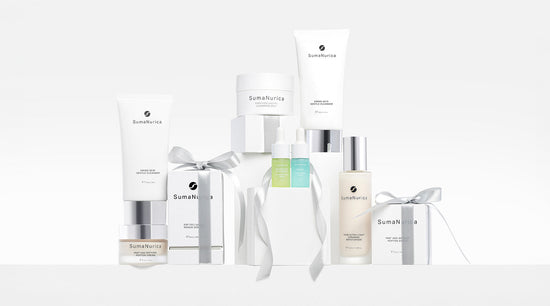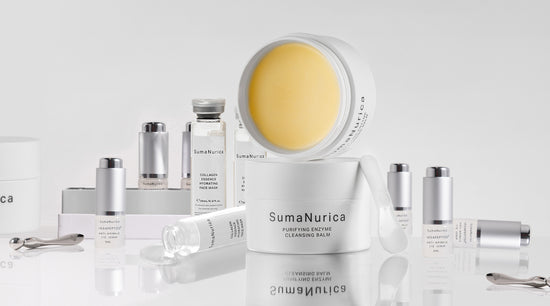Difference Between Sensitive and Reactive Skin
While sensitive skin is shared amongst the population, it can often be confused with reactive skin. Those with reactive skin may not always have a sensitive skin type, and it’s essential to identify both causes so they can be managed accordingly.
Read on to discover the differences and similarities between the two skin conditions and how to manage them with the best skin care products. If you’re suffering from any of the symptoms of sensitive or reactive skin, don’t worry, you’re not alone; around 40% of the world’s population will experience these symptoms, and there are things you can do to heal your skin and ensure it stays calm and healthy.
If you’re looking for skincare powered by science to support your sensitive skin, explore the full range of SumaNurica biotechnology products today. For unmatched hydration, try the new Collagen Essence Hydrating Face Mask.
What is the difference between sensitive and reactive skin?
While these two skin types contain similarities, it’s important to distinguish between sensitive and reactive skin. Sensitive skin, a common skin type particularly for those with a fair complexion3, is where the skin is in a constant state of compromise – characterised by signs such as dryness, redness, tightness, or sore, uncomfortable skin, where it is difficult to determine the direct cause of the irritation.
Reactive skin exhibits a more temporary “reaction” when exposed to specific products, ingredients, or environmental factors. This reaction can be pretty extreme and is generally more visible than in people with sensitive skin. Reactive skin can appear normal when not exposed to these irritating ingredients and may not always feel dry or ‘sensitive.’
Read more on our guide to sensitive skin here [link to sensitive skin article].
Signs of Sensitive Skin
- Skin is usually thin, with a compromised skin barrier2
- Often dehydrated, dry, uncomfortable skin or tight-feeling
- General lack of elasticity and suppleness, the skin lacks moisture
- Skin is often red or feels irritated
Causes of Sensitive Skin
Sensitive skin, while usually genetic, can be made worse by certain external factors, such as your skincare routine. Those with sensitive skin should avoid over-exfoliating, using acid-based products or skincare products that contain drying ingredients such as alcohol. Prolonged harsh skin treatment can cause ongoing symptoms to worsen and won’t give your skin a chance to heal.
How to Manage Sensitive Skin
Sensitive skin should be treated gently with fragrance-free skin care products that calm, nourish, and hydrate the skin. Any cleansing and exfoliation should be done very gently – and if you notice any symptoms become worse after using certain products, it’s a good idea to give the skin a break from those products.
Signs of Reactive Skin
- Skin shows temporary reactions when exposed to specific ingredients or environmental factors
- Reactions may include extreme redness, hot-feeling skin, or raised bumps consistent with the signs of an allergic reaction.
- Symptoms usually clear shortly after the exposure has ended, depending on the severity of the symptoms.
Causes of Reactive Skin
Skin reactions are often a response to certain ingredients that you may be allergic to that have been placed on the skin, and these can be more common than you think. Fragrances, certain natural ingredients, acid-based products, preservatives, and colour agents are all common irritants to the skin.
Often, we assume that products based on “natural” ingredients are the best for our skin; however, these ingredients (as opposed to scientifically developed ingredients) can often be the biggest culprit in causing skin reactions.
How to Manage Reactive Skin
By identifying the products or ingredients that trigger an unpleasant reaction in the skin, these products can be eliminated from the skincare routine to soothe and heal the skin. Ideally, use skin care products such as gentle cleansers and fragrance-free moisturisers.
Best Skincare Products for Sensitive and Reactive Skin
Whether you have sensitive or reactive skin, it is essential to repair and maintain the skin’s barrier to give it the best chance to retain essential moisture and ultimately look healthier.
While avoiding overly harsh or drying ingredients, we’d recommend also using our Collagen Essence Hydrating Face Mask regularly to help lock in moisture and hydration and to nourish the skin’s natural barrier function to help protect against potential irritants.
Both sensitive and reactive skin will benefit from our scientifically developed collagen essence protein, specifically designed to complement our skin’s natural collagen production with minimal irritation to the skin. Regular use will help to restore strength and hydration to the skin – essential for healing the uncomfortable symptoms of both skin types. Shop our Collagen Essence Hydrating Face Mask here
Question not answered? Or want to speak to one of our friendly skincare experts? Head to our live chat in the bottom right corner and a skin specialist will be there to assist with all your skincare questions and concerns.







